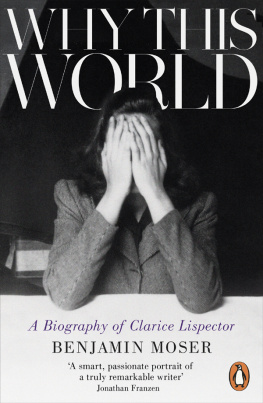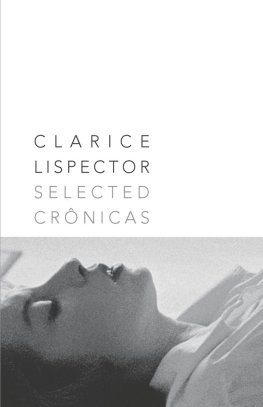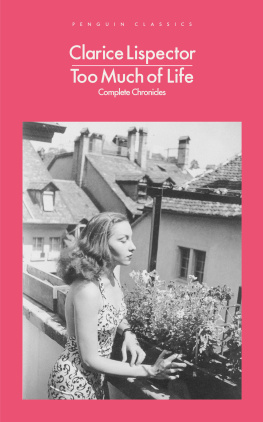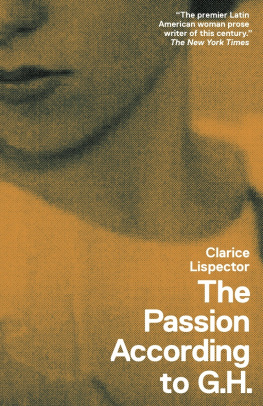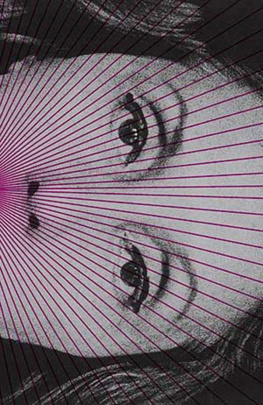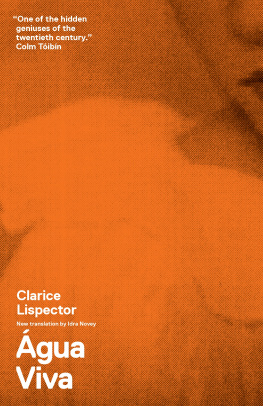SEXUALITY AND BEING IN THE POSTSTRUCTURALIST UNIVERSE OF CLARICE LISPECTOR
The Diffrance of Desire
EARL E. FITZ

TEXAS PAN AMERICAN SERIES
Copyright 2001 by the University of Texas Press
All rights reserved
Printed in the United States of America
First edition, 2001
Requests for permission to reproduce material from this work should be sent to
Permissions, University of Texas Press, P.O. Box 7819, Austin, TX 78713-7819.
LIBRARY OF CONGRESS CATALOGING-IN-PUBLICATION DATA
ISBN 978-0-292-73068-7 (library e-book); ISBN 978-0-292-78922-7 (individual e-book)
Fitz, Earl E.
Sexuality and being in the poststructuralist universe of Clarice Lispector : the diffrance of desire / by Earl E. Fitz 1st ed.
p. cm. (Texas Pan American series)
Includes bibliographical references and index.
ISBN 0-292-72528-0 (alk. paper) ISBN 0-292-72529-9 (pbk. : alk. paper)
1. Lispector, ClariceCriticism and interpretation. 2. Desire in literature. 3. Sex in literature. 4. Poststructuralism. I. Title. II. Series.
PQ9697.L585 z663 2001
869.342dc21
00-062846
DOI: 10.7560/725287
To Juli
CONTENTS
Chapter 1
CLARICE LISPECTOR AND THE WRITING OF POSTSTRUCTURALISM
Chapter 2
A SEMIOTICS OF BEING: STYLE, STRUCTURE, AND MEANING IN A POSTSTRUCTURAL KEY
Chapter 3
THE EROTICS OF BEING: SELF, OTHER, AND LANGUAGE
Chapter 4
CHARACTERIZATIONS, RELATIONSHIPS, AND STATES OF BEING: FEMININE, MASCULINE, ANDROGYNOUS, AND NONGENDERED
Chapter 5
FROM lcriture Fminine TO Littrature Engage TO WRITING THE (SEMIOTIC) BODY (POLITIC): THE SOCIOPOLITICAL DIMENSION OF LISPECTORS Textes
Chapter 6
PSYCHOANALYSIS AND THE POSTSTRUCTURAL ANXIETIES OF THE LISPECTORIAN UNIVERSE
Appendix 1
THE WORKS OF CLARICE LISPECTOR
Appendix 2
IN-TEXT ABBREVIATIONS
ACKNOWLEDGMENTS
A grateful acknowledgment is made to the University of Minnesota Press for permission to quote from The Stream of Life, translated by Elizabeth Lowe and Earl Fitz (1989); and The Passion according to G. H., translated by Ronald W. Sousa (1988). I also would like to acknowledge Carcanet Press for permission to quote from Near to the Wild Heart, translated and with an afterword by Giovanni Pontiero (New York: New Directions, 1990).
INTRODUCTION
This book makes three arguments: first, that the style and structuring of Clarice Lispectors novels, stories, and crnicas (chronicles) exemplify the issues addressed by poststructural theory; second, that her essentially poststructural textes also show, chiefly by means of their singular characters, the human face of poststructuralismthe implications this mode of thought has for the public and private identities of real men and women, particularly women; and third, that her narratives are driven by a sense of unfulfilled desire in which her characters develop more as conflicted and fragmented poststructural sites than as stable presences, and that, in a context heavily freighted with both psychosexual and sociopolitical significance, they embody the dsir de lAutre (the desire of the Other) that Lacan speaks of in crits.
While I will seek to demonstrate that a poststructural ethos permeates Lispectors sense of language and of writing, I will thus also argue that it is her expression of human sexuality, in all its conflicted, destabilizing, and boundary-effacing variety, that grounds the powerfully intellectual dimension of her work in human existences most visceral and urgent drives. In short, desirepresented by Lispector as being inseparable from languageemerges as the ultimate marker of poststructuralisms vital relevance to the lives led by ordinary people. Lispectors depiction of the sexual impulse can therefore be read as the most telling expression of poststructuralisms profoundly human basis, its centrality to the human experience.
Dealing relentlessly with the play of language in the construction of our varied identities, Lispectors narratives illustrate how the basically ontological and epistemological problems posed by poststructural thought appear when they are developed in the context of the human experience by a gifted creative writer rather than by abstract theoreticians. Lispector thus humanizes the at times abstruse and, for some, alienating issues broached by poststructural thinkers and shows just how profoundly they pertain to the human condition.
the basic philosophical and aesthetic principles that inform it as well as its sociopolitical implications and its pertinence to post-Freudian theories of psychoanalysis. In saying this, I must stress that my book does not defend poststructuralist thought per se, although personally I believe that its intellectual significance is beyond dispute. My working premise is that, whether one agrees with it or not, poststructuralism asks important and challenging questions about the relationship of language to human existence, about the nature of human consciousness, and about the political implications that derive from our desire for truth, certainty, and clarity of meaning in an unstable, ambiguous world. This is precisely the turf, thematically and structurally speaking, that Lispector so assiduously cultivated, from the beginning of her literary career in 1944 to her posthumously published final work in 1978, and encompassing her fiction as well as her nonfiction (a distinction that Lispector, like the later poststructuralists, rejected as meaningless).
In situating Lispector in the context of poststructuralism, I do not claim that she was in any way influenced by the European leaders of poststructural thought (although, given her circle of literary and artistic friends, she would have undoubtedly known about this movement in the early to mid-1970s). My point is rather different: that because for most of her career Lispector was writing what I believe were essentially poststructural texts before poststructuralism as such even existed, we can, now that the basic tenets of poststructuralism are well established, see how revealingly they apply to her work and how well they explain it. Her brilliant debut novel, Near to the Wild Heart, appeared in 1944, an entire generation before the recognized advent of poststructuralism, which is usually associated with the publication of Roland Barthess S/Z in 1970, seven years before the Brazilian writers death. Lispector was, in effect, a poststructuralist without portfolio, a highly original writer and thinker whose lyrical actualizations of what is fundamentally poststructural thought provide, as I will argue in the pages that follow, an effective and complete intellectual context in which to evaluate her work.
But what is poststructuralism? For Jacques Derrida, the French philosopher More written about than clearly defined, poststructuralism has been understood in a variety of ways but always [a]s a term loosely applied to an array of critical and intellectual movements, including deconstruction and radical forms of psychoanalytic, feminist, and revisionist Marxist thinking, which are deemed to lie beyond structuralism (Holman and Harmon 371). Richard Harland, representing a large group of critics who rightly regard deconstruction and poststructuralism as not being synonymous (with the former being one particular actualization of the latter), has suggested that there are three main divisions of poststructuralist thought: the


